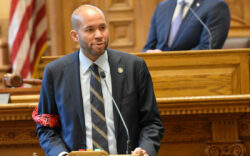Sex—that’s what students in Georgia could be hearing less about if a raft of legislation moving through state Senate committees keeps moving before the big legislative deadline at the end of the month.
In the final scheduled hearing of the Senate Committee on Education and Youth before Crossover Day, senators passed bills aimed at removing “harmful materials” from school libraries and eliminating sex education for fourth-graders and younger. In a separate meeting, the Senate Committee on Government Oversight passed bills aiming to cut ties with the American Library Association, as well as authorizing schools to display the Ten Commandments and employ school chaplains.
Education Committee Chair Sen. Clint Dixon’s Senate Bill 394 aims to set up new standards for schools to restrict so-called harmful materials. The sticking point was part of the state’s definition for sexual conduct: “actual or simulated acts of masturbation, homosexuality, sexual intercourse, or physical contact in an act of apparent sexual stimulation or gratification with a person’s clothed or unclothed genitals, pubic area, buttocks, or, if such person is female, breasts.”
The inclusion of the word “homosexuality” in the state’s definition of sexual conduct led some Democrats and members of the public to fear books depicting same-sex relationships would be targeted for removal even if they are not graphic or sexual.
Last year, the American Library Association reported an increase in the number of books challenged in libraries and that “most of the challenges were to books written by or about a person of color or a member of the LGBTQIA+ community.” A former Cobb County teacher is in an ongoing legal battle after she was fired for reading a picture book called My Shadow is Purple. That book is not explicit, but some parents said a book starring a gender non-binary character was not appropriate.
“It’s like an attempt to indoctrinate values,” said Sen. Elena Parent (D-Atlanta). “The claim has been, ‘Oh, there’s all this indoctrination.’ Well, there’s a lot of indoctrination in trying to wipe out discussions about past history, racism or gay kids, and it’s not going to happen, OK? It’s not going to happen.”
Dixon said gay people are not being targeted, and the law applies equally to any kind of smut hiding on school shelves. “It has to do with sexual content in books, heterosexual, homosexual, any of that. We don’t want to expose our kids to any of that. When they’re minors, there’s no business for them to be looking at any of that,” he said.
The committee also passed a library bill backed by Cumming Republican Sen. Greg Dolezal that removes an exception for school libraries in state code banning distribution of materials harmful to minors. Librarians said they feared they could lose their jobs if they inadvertently hand out a book a parent finds objectionable. The committee approved an amendment to the bill carving out a defense for libraries that have made good faith efforts to remove all harmful materials.
An effort to cut ties with the American Library Association over culture war clashes also moved through committee after sponsor Sen. Larry Walker, a Perry Republican, removed language that vexed librarians and the schools that teach them. Walker said the latest version of the bill would allow Valdosta State University to continue paying the ALA to accredit its library master’s program.
Dixon also found approval for a bill reshaping how and when Georgia students learn about the birds and bees. His SB 532 would prohibit sex education before fifth grade and states that no public school system would be required to offer sex education at all. Instead of parents who don’t want their kids learning about sex from their teachers opting out, parents would have to opt in. Dixon said the bill allows for age-appropriate lessons on child abuse awareness and prevention as well as menstruation.
Stephanie Tanner, a lobbyist with the Georgia School Board Association, said the opt-in feature could rile local districts. “Our major concern with the way the bill reads is that it overrides local control and requires sex education to be an opt-in by parents,” she said. “Currently, as we’ve discussed, state law requires parents to be allowed to review the materials for sex education and opt their child out of sex ed. So just a little unclear about that piece of the bill, what the goal is there. It feels overly burdensome and like we’re creating this time consuming administrative and record-keeping process and that doesn’t seem to go with the spirit of the bill otherwise.”
Tyrone Sen. Marty Harbin’s SB 501 allows schools to place copies of the Ten Commandments in each classroom, and his SB 379 could help bring in someone to explain what they mean by bringing in chaplains to serve in schools.
“We have chaplains currently in our military, we have chaplains in our prisons and correctional institutes, we have chaplains in our universities and colleges, our sports teams have them, fire and police all have chaplains, but a chaplain is missing in the sense of our schools today,” he said.
Harbin said chaplains will be able to perform many of the duties of school counselors but also be more of an informal advisor and confidant.
Georgia ACLU First Amendment policy advocate Sarah Hunt-Blackwell said her group does not agree. “We oppose this bill because it jeopardizes the safety and well-being of non-Christian students and LGBTQ+ students in Georgia,” she said. “There’s no language accounting for the First Amendment right of religious expression for all religious beliefs. Most chaplains are ‘Christian-based, readied with a biblical perspective.’ That’s a direct quote from the National School Chaplain Association website.”
This article originally appeared at the Georgia Recorder.
Like what you just read? Support Flagpole by making a donation today. Every dollar you give helps fund our ongoing mission to provide Athens with quality, independent journalism.










